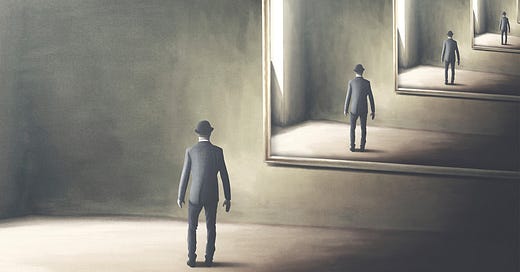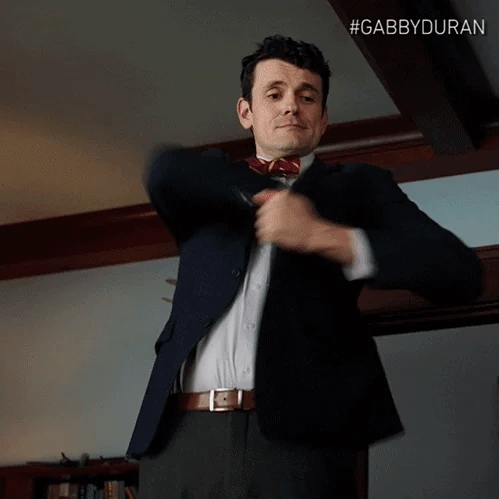Being a teacher is weird, especially when you’re teaching the art form you practice. Sit down to write, and you’re looking at yourself looking at yourself looking at yourself.
We’re doing that today. Here’s one way to write a novel.
Ideas are overrated
Someone next to me on a plane asks me what I do. If I tell the truth about my job—and usually I just lie that I’m in sales—invariably my seatmate will say I have a great idea for a novel, but you have to promise not to steal it.
(A favorite subvariant is: you can have my idea if you give me 80% of the advance!)
The idea is usually a sketched-out plot outline. Sometimes it’s personal and, because of that, compelling. Humans are interesting! Other times it’s a shark attack thriller from someone who doesn’t really swim.
In writing class, I describe this as top down thinking. You read a gripping interview with a reformed pirate, you learned a fact about octopi that keeps you up at night, you’ve always wondered why there isn’t already a book about people riding dolphins like they’re horses. (It could be for kids!) You’re starting at 50,000 feet, marveling at your big picture. And who knows—if you’re a commercial fisherman or a marine biologist, it’s possible that this really is the book you need to write.
But it’s probably not.
A big reason why would-be novelists stop at five thousand words is because they can’t imagine what comes next. They don’t have the expertise, or the frame of reference; they can’t picture it in their heads. It’s not exciting, researching every sentence or (worse) making it up on the fly. Or maybe it is exciting—but the second someone whose brother is a dolphin wrangler reads your book, the jig is up.
Like, I love the bar scene in Good Will Hunting, where Matt Damon really gives it to this annoying little puke of a grad student, because the guy has such a punchable face—
—but as someone who has been in academia for a hot minute, I can assure you that this is pure fantasy. The PhD candidates are in the corner, talking about Succession and drinking cheap bourbon. No one is quoting economic theory to try to pick up a girl studying o-chem. And despite this, Good Will Hunting succeeds as a film, because the parts set in Southie—where Damon and Ben Affleck, the writers of the film, are from—are so lived-in and real.
But, you tell me, the idea I have is set in a small town in southern Georgia, and I’M from a small town from southern Georgia, I know what I’m talking about. Why wouldn’t my idea work?
Actually, I think it will!
But is it enough to sustain a whole novel? And if you want to write another one…do you just have to wait around for inspiration to strike?
For the record, I truly hate the idea of inspiration.
We contain multitudes, dammit
I ask the students in my novel writing class to come in on day one without an idea for their book. I want us all to escape the tyranny of ideas. I don’t want you to have to meditate on idea mountain and only come down when you’ve been like, really struck by lightning. We need a process, a series of steps we can go through, that lets us build out the framework for a book that’s bursting with compelling things for us to write about. A framework for a book that will blow past five thousand words, no sweat.
Instead I ask my students to make a two lists.
The expert list
Or, where you catalog your brain.
Set a timer and say, okay, I need to write down at least ten things I’m an expert on, and I have two minutes to do it.
So what am I an expert on?
You probably want to start with jobs you’ve had, or the thing you studied in school. Maybe you watch a lot of Kurosawa movies. Put it on there! But you need to go more granular than that. Think about your every day, sun up to sun down. The things you’ve done for years. What are they actually? Where are you actually going? What were the haunts of your childhood, your teens, your middle age? Get as specific as you can.
Here’s my some items from my list, so you can get a sense of this:
Sherlock Holmes
Confessional poetry, the mid-century American kind
Contemporary poetry and contemporary poets, where we live and what we do and what conversations we have over and over
Personal shopping for wealthy ladies
Selling hats in tourist towns
Boarding schools
Catholic schools
Being Italian-American
Summer camps
the Illinois State Fair
Midwestern academia / the MFA-PhD thing / teaching and being taught
the Buffalo Bills
Springfield, IL; Traverse City, MI; Milwaukee; Madison; a bunch of Vermont; Edinburgh, Scotland; about three blocks of San Jose, CA
Being really broke in an expensive city
Being a fish out of water in an east coast American school
Being an American in the UK
The layout of your garden variety Target (if we’re being real)
And so on. (Is this where this newsletter officially earns its name?)
You might include outsourced knowledge, too, especially if that source is living in your house. Do you have ready access to someone who’s an avid golfer and owes you a favor? As I’m a mystery writer, I was delighted to learn that my brother-in-law used to work in law enforcement. He’s also very patient about answering questions, so I can put ‘small town police work’ on my list.
This list isn’t static. Write it on paper. Stick it somewhere you’ll walk by often, and add at your leisure. I’ve had mine for twenty years, and it gets shaggier and weirder as I go on.

The reading list
Round two. This works best if you’re in the place where you keep your books. Start scanning your titles, looking for commonalities.
What do you love to read about? What are you obsessed with?
And I’m not talking about tropes, or top-down descriptions like ‘the hero’s journey’ or ‘fantasy’ or ‘doorstoppers.’ Don’t describe plots entire. Again, we’re getting more detailed than that.
I might look at Megan Abbott’s Dare Me, one of my favorite books, and I’ll write down cheerleading; intense competition; small town claustrophobia; girl on girl violence; murder; teenage best friend obsession; Svengali teachers (though in this case, she’s a coach). One reason this is a favorite book, other than the terrific prose and craftmanship, is because everything it contains is something I love to read about.
But oh look, down the shelf, there’s a book on backpacking in Alaska with an all-male cast, and everybody survives it…what do I do now? It’s so different to the Megan Abbott. Ask yourself: is this new book a one of one? Does it connect to nothing else you love? If it is, move on. If you look down a shelf and see another book about frigid climates (I’m looking at you, Nights of the Circus), game on.
This process might take awhile, but I promise it’s worth it. Again, a physical list is best.
Here’s an excerpt of mine, for reference:
Sherlock Holmes (shocking)
The World’s Fair and the Crystal Palace Exhibition
Britain, esp. Victorian and Edwardian, esp. London
Chicago, esp. nineteenth century Chicago
The Australian outback (this is a new one)
Victoriana, esp. collections and collectors, gentleman scientists, medicine
Twins
Psychics
Detective work
Governesses
The feminine Gothic, from today’s vantage point (ex. Sarah Waters, Margaret Atwood)
Boarding schools
Svengali teachers
Retellings, esp. fairy tale
Terrifying type A geniuses, esp. female
Competitive female sports that demand bodily perfection
Novels that begin after the terrible thing has happened
Emotional speculative elements (usually time traveling within one’s own life)
The slowest of slow burn romance
Anything about south Boston (I blame Dennis Lehane)
Medieval England and France, esp. featuring cloisters, abbeys, etc.
If you need a beat, put the lists away, and come back to them later with fresh eyes. If you’re feeling energized, move immediately to—
You can have everything you want
—the fun part.
I put my lists next to each other. And then I start circling the things that want to be in the same book. What goes together? What complicates what you already have? What can’t you bear to leave out?

Be a kid in a candy store. You know this stuff! You love this stuff! Let’s make art from it.
For example, my first novel, A Study in Charlotte, is about the following.
Sherlock Holmes
Retelling
Boarding schools
Victoriana / Victorian London, but in retrospect
Being a fish out of water in an east coast American school
Being an American in the UK (and a Brit in America)
Detective work
Terrifying type A geniuses, esp. female
The slowest of slow burn romance
Novels that begin after the terrible thing has happened
and I could keep going. When I look at these items in a list, they start to suggest a novel. One that’s stuffed with everything I feel confident writing about and that I love to read about. I start seeing the outlines of characters, conflicts, settings, story.
I shaped Charlotte that way, and as I was writing it, I discovered other things I loved to write about. I added them to the lists. I used the lists to make other novels.
Now it all sort of spirals around in my head, these things that I find fertile and complicated and strange and story-worthy. And that’s how I get my ideas.
What are yours?







I like this so much, thank you.
Loved the exercise. Also I can’t believe I randomly stumbled upon the author of a book in my reading list.